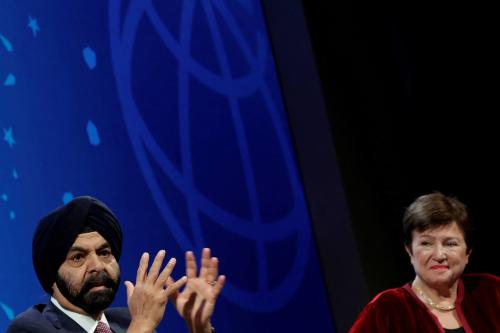Last week U.N. Secretary-General Ban Ki-moon issued his long-awaited report, “The Road to Dignity by 2030.” The report frames the beginning of the end-game for negotiations in 2015 on what will replace the Millennium Development Goals (MDGs). It suggests six “essential elements” as a way of simplifying and communicating the 17 goals and many dozen targets recommended by the intergovernmental Open Working Group (OWG).
While many observers hoped the text would somehow prioritize and slim down the comprehensive package crafted as a political compromise by the OWG, Mr. Ban welcomed the outcome and took “positive note” of the General Assembly decision to make it the basis of negotiation. In addition to giving prominence to themes such as justice, dignity and prosperity, he also presents a strong message on the need for a new and ambitious financing strategy that takes note of the business sector’s potential for a more developed monitoring and accountability structure compared to the MDGs. Many countries appreciated the secretary-general’s approach in their first official responses. The months ahead will see how they carry forward the various elements, goals, and targets.
Amidst the policy complexities, it is worth stepping back to consider the nature of the most fundamental high-level political agreements essential to advancing the agenda. As a reference point, the Millennium Development Goals were set in 2000, but only came to life after the March 2002 Monterrey Consensus forged two overarching global deals. One was the agreement that markets are the driver of long-term economic growth, and public sectors have a responsibility to support them. This resolved a decades-long battle over the role of state versus markets. The other was an agreement that developing country governments have primary responsibility for their own destiny, but the poorest countries need active support from the richest countries in order to meet major development goals.
Similarly, over the coming year, the sustainable development agenda can be boiled down to the need for countries to converge around three breakthrough global political agreements.
The first breakthrough agreement is to provide every human being with the minimum basic services required to permit them to participate in and benefit from globalization. These minimum standards—which have been described elsewhere as “leaving no one behind” and “global social floor”—would provide dignity for all, end extreme income poverty and hunger, provide minimum levels of schooling and healthcare, and ensure access to basic infrastructure services like energy, water, road transport and bank accounts. They would eliminate the most pernicious forms of exclusion. They imply a new global social contract based on meeting people’s needs and aspirations, not those of countries.
The second breakthrough agreement is a new global approach to infrastructure—one that ramps up the investments required to boost prosperity, ensure resilience, and reduce global carbon emissions. In dollar terms, infrastructure investments—to build planet-friendly energy networks, transport systems, information highways, and urban habitats—require the most financing in the global sustainable development agenda, estimated at roughly $3 trillion a year in developing countries alone. Most, but not all, of these investments will be funded from domestic savings. Foreign savings will also need to be mobilized, but the current international development finance system falls orders-of-magnitude short in intermediating foreign savings and long-term investments in developing countries. Consider that the World Bank Group’s financing for infrastructure was just $24 billion in 2014, a drop in the bucket of what is required. Moreover, the majority of the world now lives in cities, so a huge share of infrastructure investments need to take place at the municipal level. But there is no systematic approach to helping developing countries’ sub-sovereign entities access finance.
Infrastructure is usually considered to be more a technocratic subject than a topic for global political bargains. But without new agreements at the highest political level, many countries will be unable to meet their sustainable development needs. Most pressingly, in most of the world, low-cost energy is high-carbon energy, and low-carbon remains high-cost. This must change. What can be done? Advanced countries need to develop and support the expansion of new low-carbon technologies, especially for electricity generation, transmission and distribution. They can also help prepare specific projects, as the G-20 Global Infrastructure Hub proposes to do. They can encourage the multilateral institutions they control to lend more for low-carbon infrastructure and provide more guarantees to leverage private capital. Meanwhile developing countries can take on more responsibility for funding infrastructure themselves, which is why the new BRICS bank and the Asia Infrastructure Investment Bank have been created. They can also ensure that infrastructure projects are efficiently planned, get properly used and maintained, avoid corruption, and use high environmental and social standards.
The third breakthrough agreement is about enhanced accountability among governments and industry. There will be no legal international enforcement of the sustainable development goals so—to a vastly greater extent than under the MDGs—countries will need to apply their own specific targets to commonly identified global challenges. The secretary-general has rightly recommended regional peer reviews as one way of holding country governments accountable, but real teeth will only come from a compact between governments and their own citizens.
Businesses, too, need to be held more accountable if the sustainable development goals are to be met. This does not have to be done in a contentious way. Major companies like Unilever and DuPont have pioneered new approaches to long-term, multi-dimensional corporate reporting that already makes management and other stakeholders aware of the social and environmental footprint of their activities. More than 1300 companies have signed on to the Principles for Responsible Investment. From Hong Kong to Johannesburg, many stock exchanges around the world are requiring sustainability reporting from their listed companies, while U.S. regulators are asking companies to report on their sourcing of conflict minerals. Multiple pension funds, especially in Europe, have leveraged their public mandates to apply long-run environmental and social accounting standards.
It is time for a more assertive approach to business accountability. Mr. Ban asks countries to require mandatory sustainability reporting for companies, along with regulatory changes to make sure that profit-maximizing competitive behavior promotes sustainable business activities. In the simplest terms, Coca-Cola will be more willing to implement new reporting standards if PepsiCo and India’s Tata Tea do too.
There will be lots of heated debate over the shape of the post-2015 agenda in coming months. But stepping back from the details, if the process results in an agreement to establish minimum services for humanity, develop new global mechanisms for financing infrastructure, and define new accountability standards for governments and businesses, it would be a dramatic change from business-as-usual. Mr. Ban’s report challenges countries to forge fast consensus on these breakthrough areas for agreement.



Commentary
Three Breakthrough Agreements Will Underpin the Post-2015 Global Agenda
December 9, 2014